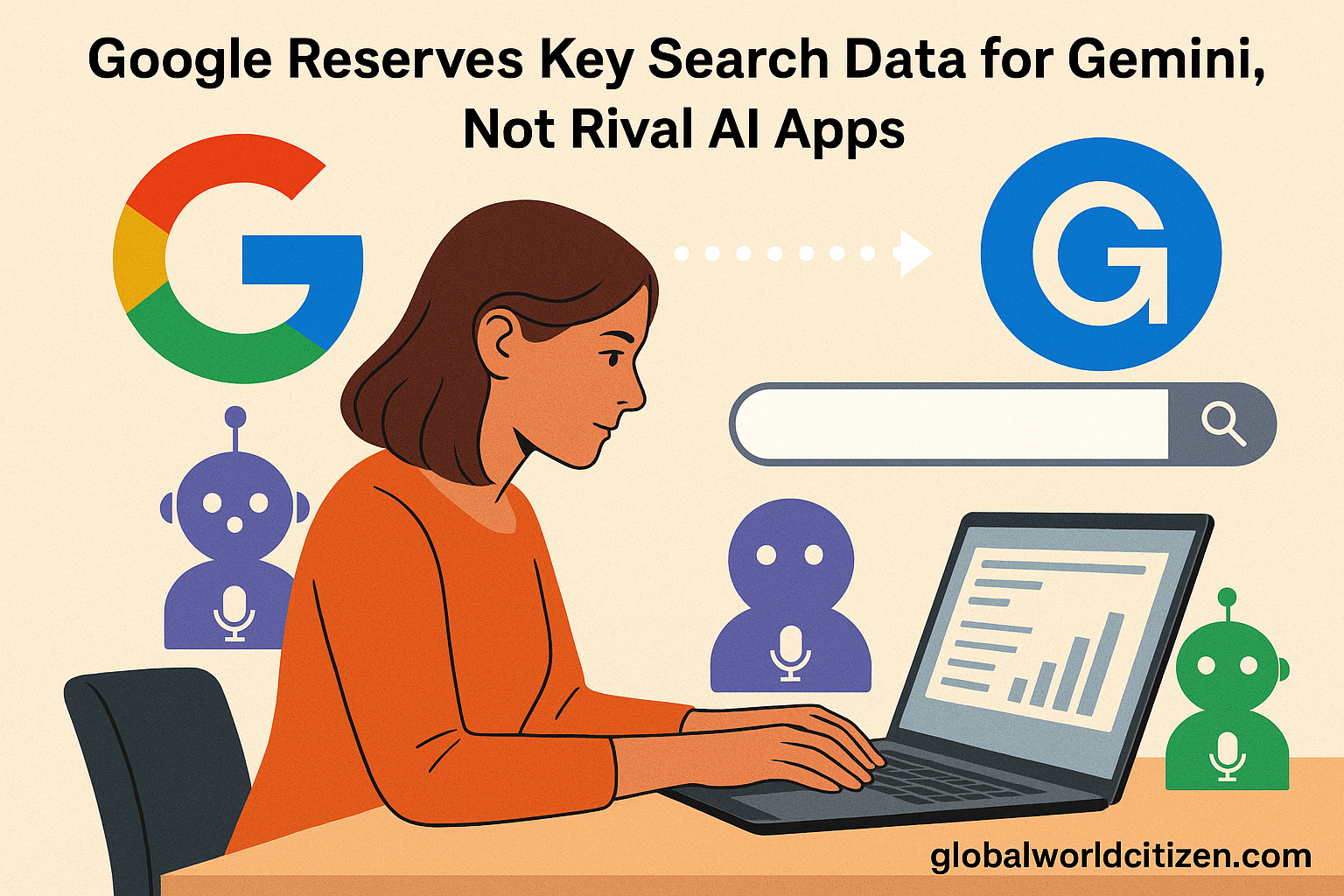Published: May 6, 2025 ✍️ Author: Global Tech & Data Desk 🌐 Source: GlobalWorldCitizen.com
In a pivotal moment for the global AI economy, Google is under scrutiny for allegedly favoring its Gemini AI platform by granting it exclusive access to enhanced Google Search data — including features like Knowledge Graph and OneBox — while limiting access to rival AI models and developers, according to testimony in a high-stakes U.S. antitrust case.
During federal court proceedings this week, Liz Reid, Google’s Head of Search, confirmed that only Google’s in-house Gemini AI receives privileged results beyond basic web listings. External developers using Google’s Vertex AI may access search data, but not the same level of integration or real-time intelligence available to Gemini.
“Web results are the same,” Reid said. “But Gemini gets additional results through enhanced Google search features.”
 Why This Matters: Data Access = AI Dominance
Why This Matters: Data Access = AI Dominance
At stake is control over one of the world’s most powerful data engines — the Google Search Index. With billions of indexed pages updated in real time, it’s the most comprehensive dataset for grounding AI outputs in reliable, trusted information.
In today’s AI landscape, grounding models in real-world search data ensures accuracy, safety, and relevance — making search data the backbone of global AI infrastructure.
Since May 2024, some AI firms have been able to use Vertex AI’s Search grounding, but only Google’s Gemini AI taps into Google’s full Knowledge Graph ecosystem, giving it an unmatched competitive advantage.
 DOJ’s Battle to Democratize Search Access
DOJ’s Battle to Democratize Search Access
The U.S. Department of Justice (DOJ) — which previously ruled that Google unlawfully monopolized the search market — is pushing for far-reaching reforms, including:
Forced data-sharing with rival AI developers
Independent access to build alternative search indices
Transparency requirements for sites used in AI model training
Opt-out tools for content creators whose data fuels AI
Google, however, calls the plan “invasive” and “impractical,” with Reid estimating it could divert over 2,000 engineers to regulatory compliance and pose new cybersecurity threats — though she admitted this was an internal approximation, not a technical audit.
 Global Implications: The AI Data Arms Race
Global Implications: The AI Data Arms Race
This legal showdown isn’t just a U.S. issue — it’s a global debate on digital power, AI fairness, and tech sovereignty.
Competitors such as OpenAI, Meta, and Anthropic are heavily reliant on grounding their models in reliable data sources — many of which originate from Google’s index:
OpenAI reportedly requested access to Google’s index in August 2024 — and was denied.
Meta CEO Mark Zuckerberg acknowledged that Meta’s LLaMA model uses Google grounding.
Anthropic, backed by a $3B Google investment, is seeking deeper access for its Claude AI model.
Despite industry partnerships, Reid’s testimony confirms Google is reserving its best data streams for its own ecosystem, potentially stifling innovation across the AI economy.
 GWC Insight: Search Sovereignty is the Next Digital Frontier
GWC Insight: Search Sovereignty is the Next Digital Frontier
At GlobalWorldCitizen.com, we view this as a critical inflection point in the race to define the future of artificial intelligence, where access to real-time search data is the new oil.
The outcome of this case will influence:
AI competition and innovation equity
Data sovereignty and platform fairness
The future of digital knowledge access for all humanity
As AI becomes the invisible infrastructure of modern society, the question remains:
Who controls the inputs that shape our global digital outputs?
 Stay Informed with GlobalWorldCitizen.com
Stay Informed with GlobalWorldCitizen.com
For exclusive insights into the global AI race, Big Tech regulation, and the evolving search economy, subscribe to:
Global World Technology
Global AI & Data Sovereignty
Global Policy & Digital Governance
Your go-to destination for decoding the power moves shaping our digital future.

